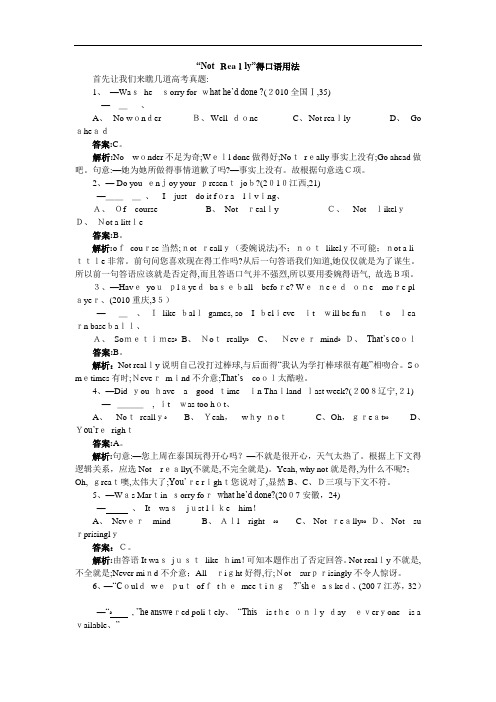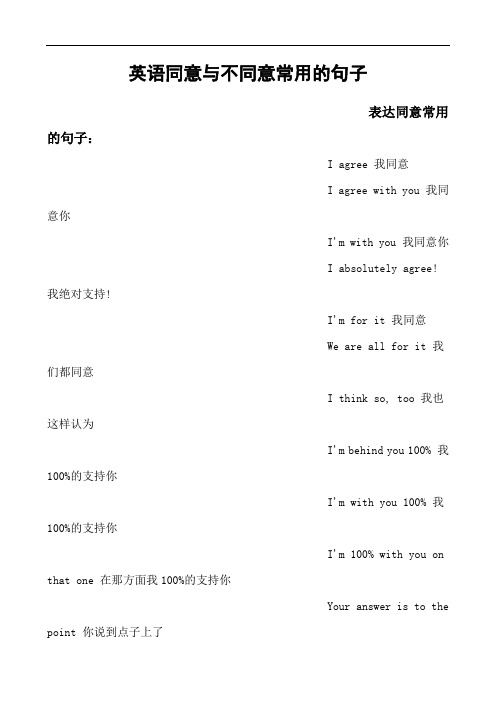Not really
- 格式:ppt
- 大小:81.00 KB
- 文档页数:16

常见的肯定形式表示否定意义■anything but 决不(=not…at all)Your answer is anything but perfect. 你的答复一点儿也不完美。
注:该结构也可如下例一般,表示“除~外,任何都…”之意:I’ll give you anything but that. 除了那个之外,我什么都可以给你。
■far from 完全不The show was far from being a success. 那次表演并不成功。
■fail to 无法~(=do not, cannot)Even Big Ben failed to strike correctly one day when its chiming mechanism failed. 即使是大笨钟(英国国会议堂大钟),都有可能因为敲钟装置故障而有敲错的一天。
注:never fail to 意为“一定”。
如:He never fails to write home to his parents every month. 他每个月必定写信给他的双亲。
■too…to… 太……,以致无法……He was too young to have learned to say no to a woman. 他太年轻了,还没学会向女人说不。
■the last+名词+to不定式〔关系代词从句〕最不……Jack would be the last man to believe that. 杰克是绝对不可能相信这种事的人。
He is the last person who(m) we would want to come. 他是我们最不欢迎的人。
■much [still] less 更别提He can hardly understand French, much less Latin. 他不太懂法文,更别提拉丁文。
注:let alone 也有“更别说”之意:He cannot speak German, let alone Dutch. 他不会说德文,更别提丹麦文了。

noreally口语中意思
【最新版】
目录
1.no really 的口语用法和含义
2.no really 的常见场景和表达方式
3.no really 与其他类似表达的比较
正文
在英语口语中,no really 这个短语经常被用来表示惊讶、怀疑或者否认。
它的含义通常是“真的吗?”或者“不,真的吗?”。
这个短语常常用来表示对话中的一方对另一方的话语表示怀疑或者惊讶。
在日常生活中,人们经常使用 no really 来表达自己的情感或者态度。
比如,当听到一个出乎意料的消息时,人们可能会脱口而出:“no really?”(真的吗?)。
又或者,当别人对某件事情表示怀疑时,你也可以用 no really 来表示自己的惊讶:“I can"t believe you don"t know this.No really!”(我不敢相信你不知道这个。
真的吗?)
有趣的是,no really 有时也可以用来表示礼貌的拒绝。
比如,当别人邀请你一起去做某件事情,但你并不想去时,你可以回答:“No really, I don"t think I"ll go.”(不,我真的不想去。
)
在英语口语中,还有很多其他的表达方式可以表示 no really 的含义。
比如,人们还可以用“really?”(真的吗?)或者“seriously?”(真的吗?)来表示自己的惊讶或者怀疑。
不过,这些表达方式与 no really 相比,语气可能会有所不同。
总的来说,no really 是一个非常常见的英语口语短语,它可以用来表示各种各样的情感和态度。
第1页共1页。

“Not Really”得口语用法首先让我们来瞧几道高考真题:1、—Washesorry for what he’d done ?(2010全国Ⅰ,35)—______、A、No wonder B、Well done C、Not really D、Go ahead答案:C。
解析:No wonder不足为奇;Well done做得好;Notreally事实上没有;Go ahead做吧。
句意:—她为她所做得事情道歉了吗?—事实上没有。
故根据句意选C项。
2、— Do you enjoy your presentjob?(2010江西,21)—______、I just do it for a living、A、Of course B、Notreally C、NotlikelyD、Not a little答案:B。
解析:ofcourse当然;not really(委婉说法)不;notlikely不可能;not a little非常。
前句问您喜欢现在得工作吗?从后一句答语我们知道,她仅仅就是为了谋生。
所以前一句答语应该就是否定得,而且答语口气并不强烈,所以要用委婉得语气, 故选B项。
3、—Haveyouplayedbaseball before? Weneedone more player、(2010重庆,35)—______、Ilike ballgames, so I believeitwill be funtolearn baseball、A、SometimesﻩB、NotreallyﻩC、NevermindﻩD、That’s cool答案:B。
解析:Not really说明自己没打过棒球,与后面得“我认为学打棒球很有趣”相吻合。
Sometimes有时;Nevermind不介意;That’s cool太酷啦。
4、—Did you have a good timein Thailand last week?(2008辽宁,21)— ______, itwas too hot、A、NotreallyﻩB、Yeah,why notC、Oh,greatﻩﻩD、You’reright答案:A。

no really和not really的区别实用一篇no really和not really的区别1I'm scared.No kidding,really.我很害怕。
不是开玩笑,真的。
No,I really doubt it.我对此却持怀疑态度。
I'm not really a city person.我不是一个很喜欢城市生活的'人。
He's not really a very serious person.他并非完全是一个非常严肃的人。
He's nice enough but not really my cup of tea.他这人挺不错,但不是我特喜欢的那种人。
no really和not really的区别实用一篇扩展阅读no really和not really的区别实用一篇(扩展1)——very和really的用法区别实用二篇very和really的用法区别1例句:The show is very amusing and the cast is very good.表演非常有趣,演员都很优秀。
The fence was very strongly built,with very large posts.这个栅栏用粗大的`木桩建得非常坚固。
He is very quick-thinking and very much a man of decision.他思维很敏捷,是个很果断的人。
I thought he was very attractive and obviously very intelligent.我认为他很有魅力,而且显然也很聪明。
very和really的用法区别2She's very nice when you get to know her.你了解她以后就会觉得她非常可爱。
He is a very good man.他是个非常高尚的人。

not really用法Not Really用法Not Really是一个常用的英语短语,其字面意思为“不是真的”,通常用于表达对某事或某人的怀疑或不信任。
在日常生活中,我们可以经常听到人们使用这个短语。
下面将详细介绍Not Really的用法。
一、Not Really的基本含义Not Really是一个表示否定的短语,通常用于回答问题或表达自己对某事或某人的看法。
它的基本含义是“不是真的”,可以表示对某种说法、观点、行为等的否定态度。
二、Not Really在口语中的使用1. 回答问题当别人问你一个问题时,你可以使用Not Really来回答。
例如:- A: 你喜欢吃西瓜吗?- B: Not really.(不太喜欢)2. 表达自己对某事或某人的看法如果你对某件事情或某个人持有否定态度,你也可以使用Not Really 来表达自己的看法。
例如:- A: 你觉得这个电影怎么样?- B: Not really my cup of tea.(我不太喜欢这部电影)三、Not Really在书面语中的使用1. 用于文章开头引出话题在文章开头,我们经常使用Not Really来引出话题,表达自己对某个观点或说法的不同看法。
例如:Not really a fan of the current trend of social media influencers, I find their content often lacks substance and authenticity.(我不太喜欢当前社交媒体影响者的趋势,我认为他们的内容经常缺乏实质性和真实性。
)2. 用于转折在文章中,我们也可以使用Not Really来表示转折。
例如:The company claimed to be environmentally friendly, but not really, as it still uses a lot of plastic packaging.(该公司声称是环保的,但实际上并不是,因为它仍然使用很多塑料包装。

英语同意与不同意常用的句子表达同意常用的句子:I agree 我同意I agree with you 我同意你I'm with you 我同意你I absolutely agree! 我绝对支持!I'm for it 我同意We are all for it 我们都同意I think so, too 我也这样认为I'm behind you 100% 我100%的支持你I'm with you 100% 我100%的支持你I'm 100% with you on that one 在那方面我100%的支持你Your answer is to the point 你说到点子上了Count me in 算我一个You are right 你是对的You are partially correct 你部分是对的What you say is partly right 你说的有一部分是对的In a sense he's right 在某种意义上,他是对的That's a good idea 是个好主意Great idea 好主意Good thinking 好想法Good 很好Great 很棒That's great 太棒了Right 对That's Right 太对了Correct 正确That's correct 太正确了Absolutely! 一点儿没错!Sounds good 听起来很好Sounds awesome 听起来真棒Sounds alright to me 听起来挺好Sounds like a good idea to me 听起来像是一个好主意Sounds like fun 好像挺有意思Good thinking 好主意。
That's fine with me 那样很好Fantastic! 好极了!Excellent 好极了Not bad 还行/不坏No problem here 没问题No objection 没有异议No doubt 毫无疑问/确实是这样I don't have any objection to it 我不反对That's fair 当然可以Of course 当然You bet 当然/一定In a word, yes 一句话,是I bet 应该是吧Why not 为什么不/好的Bingo! 对了!Hear, hear! 说的对,说的好Yes, sir 是,先生 !I'm afraid so 恐怕就是这样Your opinion is reasonable 你的意见有道理表达不同意常用的句子:I'm don't agree 我不同意I'm don't agree with you 我不同意你To be honest, I don't really agree with you 老实说,我不太赞同你We don't agree on this point 在这点上我们意见分歧I can't agree 我不能同意I can't agree with you 我不能同意你I'm not sure I can agree 我恐怕不能同意I'm afraid disagree with you 我恐怕不同意你I'm afraid we can't 恐怕我们不能I'm afraid I wouldn't say that 恐怕我不敢苟同Are you crazy 你疯了吗?You must be kidding 你一定是在开玩笑。
“Not Really”的口语用法首先让我们来看几道高考真题:1. —Was he sorry for what he’d done ?(2010全国Ⅰ,35)—______.A. No wonderB. Well doneC. Not reallyD. Go ahead答案:C。
解析:No wonder不足为奇;Well done做得好;Not really事实上没有;Go ahead做吧。
句意:—他为他所做的事情道歉了吗?—事实上没有。
故根据句意选C项。
2.— Do you enjoy your present job?(2010江西,21)—______. I just do it for a living.A. Of courseB. Not reallyC. Not likelyD. Not a little答案:B。
解析:of course当然;not really(委婉说法)不;not likely不可能;not a little非常。
前句问你喜欢现在的工作吗?从后一句答语我们知道,他仅仅是为了谋生。
所以前一句答语应该是否定的,而且答语口气并不强烈,所以要用委婉的语气,故选B项。
3.—Have you played baseball before? We need one more player.(2010重庆,35)—______. I like ball games, so I believe it will be fun to learn baseball.A. SometimesB. Not reallyC. Never mindD. That’s cool答案:B。
解析:Not really说明自己没打过棒球,与后面的“我认为学打棒球很有趣”相吻合。
Sometimes有时;Never mind不介意;That’s cool太酷啦。
4.—Did you have a good time in Thailand last week?(2008辽宁,21)— ______, it was too hot.A. Not reallyB. Yeah, why notC. Oh, greatD. You’re right答案:A。
“Not Really”的口语用法探析首先让我们来看几道高考真题:1. —Was he sorry for whathe’ddone?(2010全国Ⅰ,35)—______.A. NowonderB.Well done C.Not really D.Go ahead答案:C。
解析:No wonder不足为奇;Welldone做得好;Not really事实上没有;Go ahead做吧。
句意:—他为他所做的事情道歉了吗?—事实上没有。
故根据句意选C项。
2.—Do you enjoy your present job?(2010江西,21)—______.I just do it for aliving.A. Of course B. Not really C.NotlikelyD. Not a little答案:B。
解析:ofcourse当然;not really(委婉说法)不;notlikely不可能;not a little非常。
前句问你喜欢现在的工作吗?从后一句答语我们知道,他仅仅是为了谋生。
所以前一句答语应该是否定的,而且答语口气并不强烈,所以要用委婉的语气,故选B项。
3.—Have you played baseball before? We needonemoreplayer.(2010重庆,35)—______. I likeballgames, so I believe it will be fun to learn baseball. A.Sometimes B.Not really C. Never mind D. That’s cool答案:B。
解析:Not really说明自己没打过棒球,与后面的“我认为学打棒球很有趣”相吻合。
Som etimes有时;Never mind不介意;That’s cool太酷啦。
4.—Didyouhave agood time in Thailand lastweek?(2008辽宁,21)—______, it was too hot.A. NotreallyB. Yeah, whynotC.Oh,great D.You’re right答案:A。
高三英语交际用语试题1. ---Would you like to read some news about the football game, Jane?---______. I feel like doing something else.A.Not likely B.No problemC.Not really D.Never mind【答案】C【解析】考查情景交际。
句意:简,你喜欢年足球新闻吗?不喜欢,我喜欢别的。
根据I feel like doing something else可知不喜欢,故选C项。
考点 : :考查情景交际2.—Excuse me , Victor, but I have a favor to ask of you---_____A.Ask , please B.My pleaseC.Go ahead D.Good for you【答案】C【解析】考查情景交际。
句意:对不起,维克托,我有事要问你。
说吧。
Go ahead 表示同意对方的请求,根据情况可译为:说吧,做吧,开始吧,进行吧。
如: A: May I start? 我可以开始了吗? B: Yes, go ahead. 好,开始吧,故选C项。
考点 : 考查情景交际3.—Can I help you? Are you looking for anything in particular today?—________.We're just looking.A.Yes, please B.No, thank youC.Yes,you can D.No, you needn't【答案】B【解析】B[考查交际用语。
问话者想给对方提供帮助,答语者要么拒绝,要么接受,但是要考虑礼貌用语,所以不选A,选择B。
]4. --- Why not stay here a little longer?--- _____, but I really have to go.A.Never mind B.I’d love toC.Pleased to meet you D.I can’t find any reason【答案】B【解析】I’d love to 或I’d like to是一种委婉的推辞,B 选项答语意思是“我本来想留下来,但我不得不离开”。